Key takeaways
- The Portland writers community fosters a supportive environment that encourages creativity and vulnerability among writers of all experience levels.
- Wordstock Festival serves as a vital platform for writers to connect, learn, and grow through intimate discussions, workshops, and shared experiences.
- Preparation for events like Wordstock is key, but balancing it with openness to unexpected moments enhances the overall experience.
- Personal connections and community interactions at Wordstock can lead to significant breakthroughs in a writer’s journey to finding their unique voice.
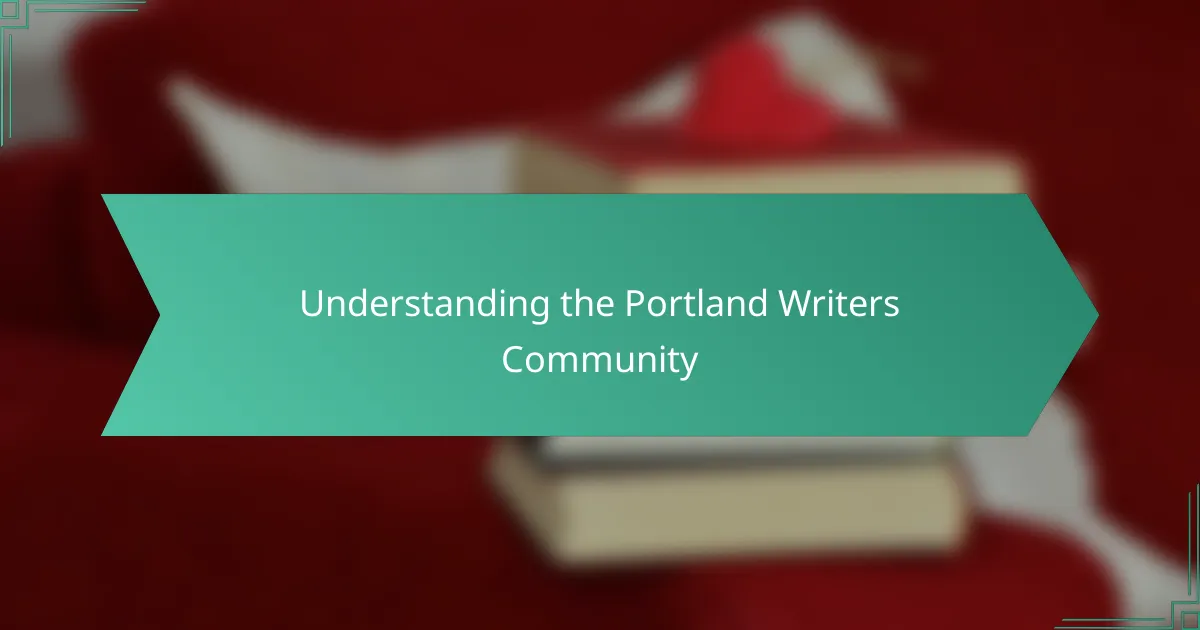
Understanding the Portland Writers Community
The Portland writers community feels like a close-knit circle where everyone encourages each other’s unique voices. I remember walking into my first meeting, unsure if I belonged, only to find myself welcomed by passionate storytellers who genuinely wanted to hear my ideas. Isn’t it amazing how a supportive environment can help you find confidence you didn’t know you had?
What struck me most about this community is its vibrant diversity—from poets to novelists, from seasoned authors to first-time writers, everyone brings something special to the table. Have you ever felt hesitant to share your work? I have, but here, vulnerability is celebrated as a strength, not a weakness. That atmosphere opened doors for me to explore not just my writing but also who I am as a creator.
Portland’s writing scene is more than just workshops and events—it’s a living, breathing ecosystem of collaboration and inspiration. I’ve seen friendships blossom over shared critiques and witnessed breakthroughs during late-night writing sessions fueled by collective energy. Could any writer ask for a better place to discover their voice? I don’t think so.
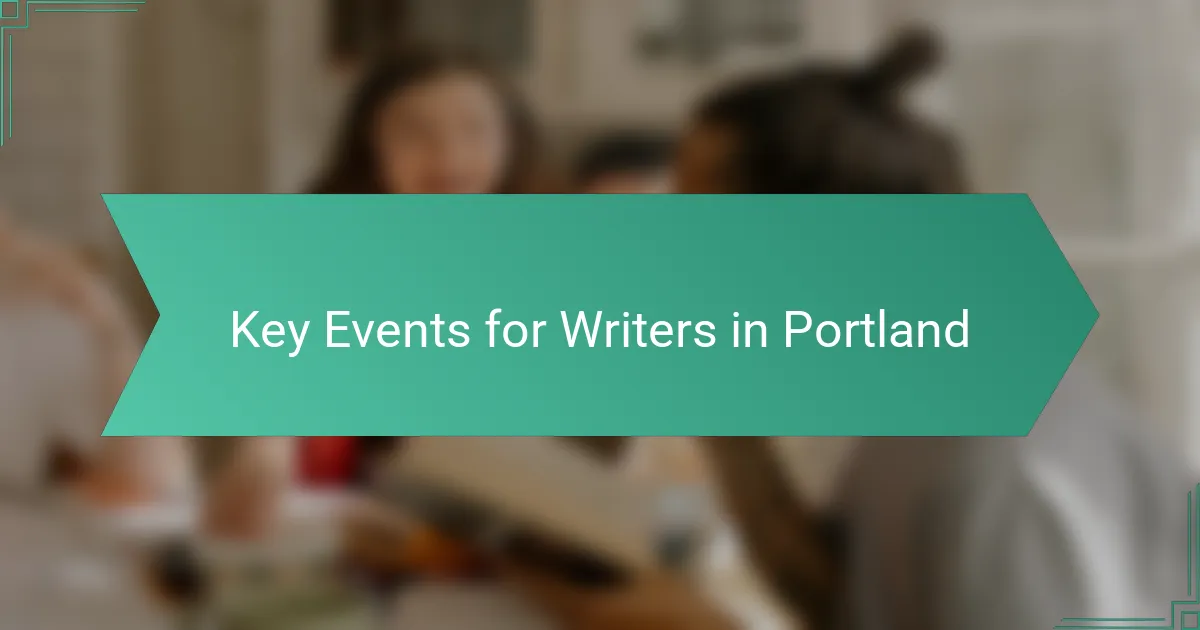
Key Events for Writers in Portland
Portland hosts a variety of key events that have been game-changers for many writers, including myself. One event that stands out is Wordstock, which feels less like a festival and more like a reunion of kindred spirits who understand the highs and lows of the writing journey. Have you ever attended an event where every panel and conversation seemed tailored just for you?
Beyond Wordstock, the city offers regular readings, workshops, and literary salons that keep the creative energy flowing year-round. I once stumbled into a late-night poetry reading that sparked ideas I hadn’t thought possible, proving how these gatherings often surprise us with unexpected inspiration. Don’t you love it when a simple event turns into a breakthrough moment?
Seattle might have its big conferences, but here in Portland, the events feel intimate and deeply connected to our community’s heartbeat. That personal touch makes all the difference—at these gatherings, it’s not just about networking; it’s about finding your tribe and, ultimately, your voice. Have you experienced an event that transformed how you see your own writing? I know I have, right here in Portland.
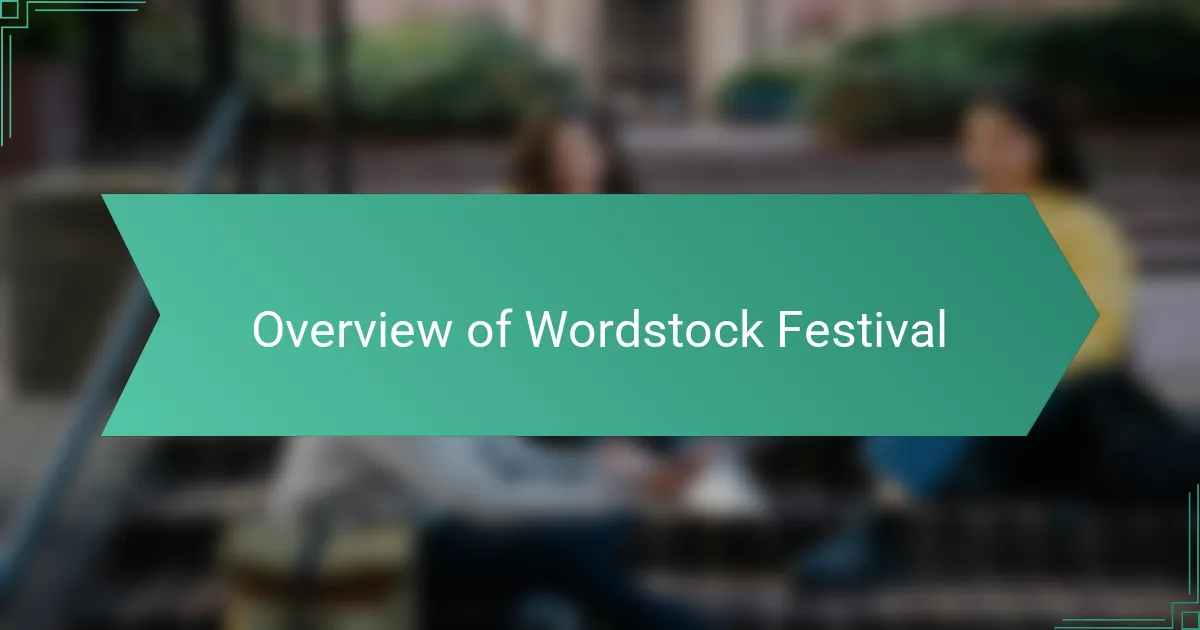
Overview of Wordstock Festival
Wordstock Festival is Portland’s flagship literary event, drawing writers, readers, and publishers into a lively celebration of storytelling. I remember my first Wordstock—it felt like stepping into a playground where every corner offered a new voice, a fresh perspective, or an inspiring story waiting to be heard. Have you ever found yourself surrounded by so much creative energy that it feels almost electric?
What makes Wordstock truly special is its blend of panels, readings, and workshops that cater to all kinds of writers. I was amazed at how accessible everything felt; whether you’re a seasoned novelist or someone scribbling in a journal, there’s a space carved out just for you. Have you ever attended an event where each session left you buzzing with ideas and a deeper sense of belonging?
Beyond the scheduled events, the festival’s atmosphere encourages spontaneous connections that often turn into lasting friendships or collaborations. I recall sharing coffee with a fellow writer between sessions, only to realize we’d sparked an idea neither of us would have had alone. Isn’t that the kind of unexpected magic every writer hopes to find?
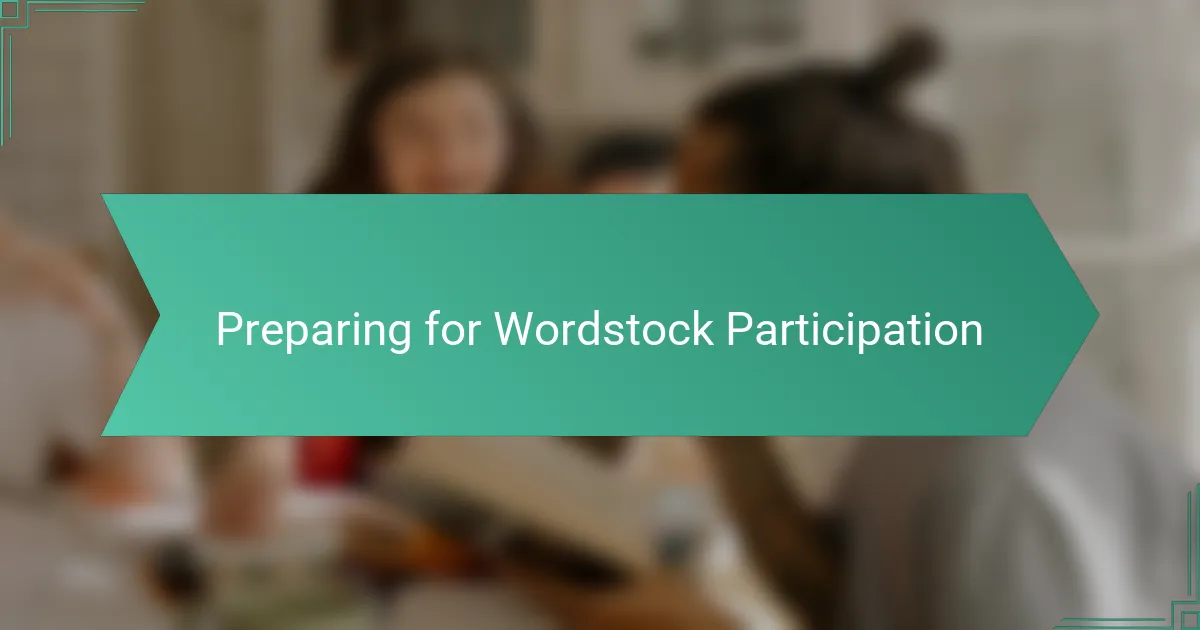
Preparing for Wordstock Participation
Preparing for Wordstock felt like gearing up for a creative adventure. I found myself jotting down questions I wanted to explore and stories I hoped to share, wondering if my voice was ready for such a vibrant audience. Have you ever prepared for something big and felt that mix of excitement and nerves swirling inside?
One thing I learned early on was to balance preparation with openness. While I reviewed panels and planned which workshops to attend, I also reminded myself to stay present and embrace the unexpected moments. That mindset turned my Wordstock experience from a checklist into a discovery process—how about you, do you plan every detail, or do you like to leave room for surprises?
Connecting with other attendees beforehand, even through social media or community forums, made a huge difference for me. It was comforting to recognize familiar names and faces when I arrived, which eased my anxiety and sparked early conversations. Have you found that a little pre-event connection can change how you experience a gathering? For me, it absolutely did.
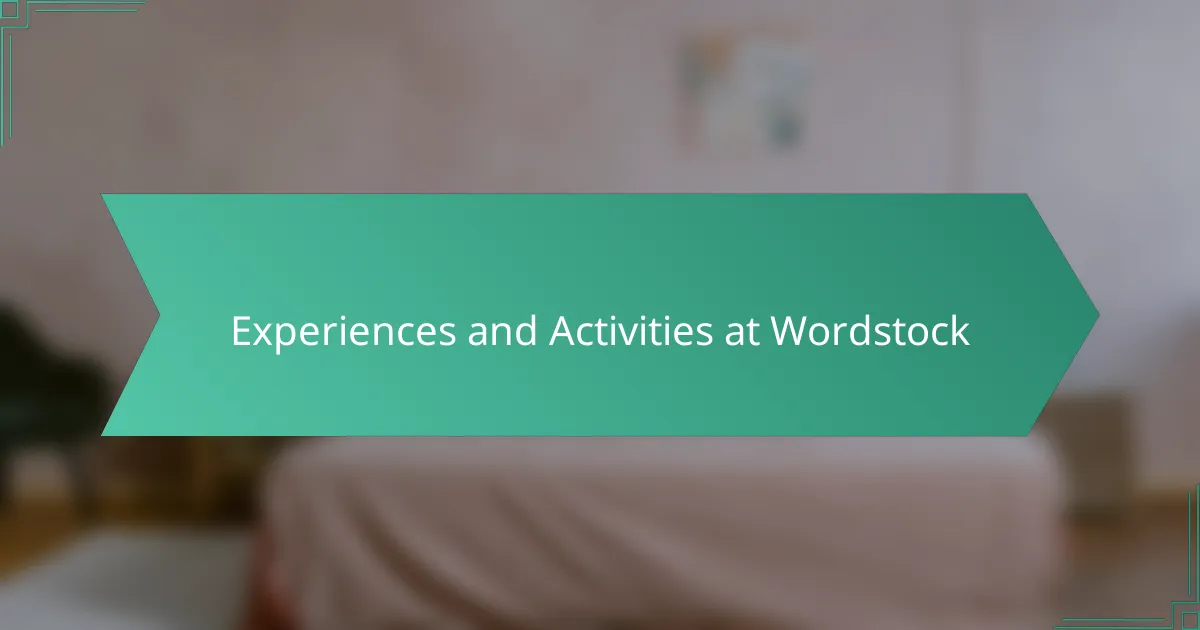
Experiences and Activities at Wordstock
At Wordstock, I dove into a whirlwind of panel discussions and workshops that stretched my understanding of storytelling. One session on crafting authentic characters struck a chord with me, leaving me eager to experiment with my own voice. Have you ever attended a talk that reshaped how you view your writing?
The festival’s readings were another highlight—I found myself scribbling notes furiously, inspired by voices so different from my own. Listening to poets, essayists, and novelists share their work reminded me why I fell in love with writing in the first place. Can you recall a moment when hearing someone else’s story lit a spark inside you?
What truly made Wordstock unforgettable were the informal conversations between sessions, where I connected with writers of all levels. One afternoon, over a shared cup of coffee, we exchanged tips and struggles, and I realized I wasn’t alone in my doubts and hopes. Isn’t it comforting to know that these shared experiences help us find not just our voices, but our community too?
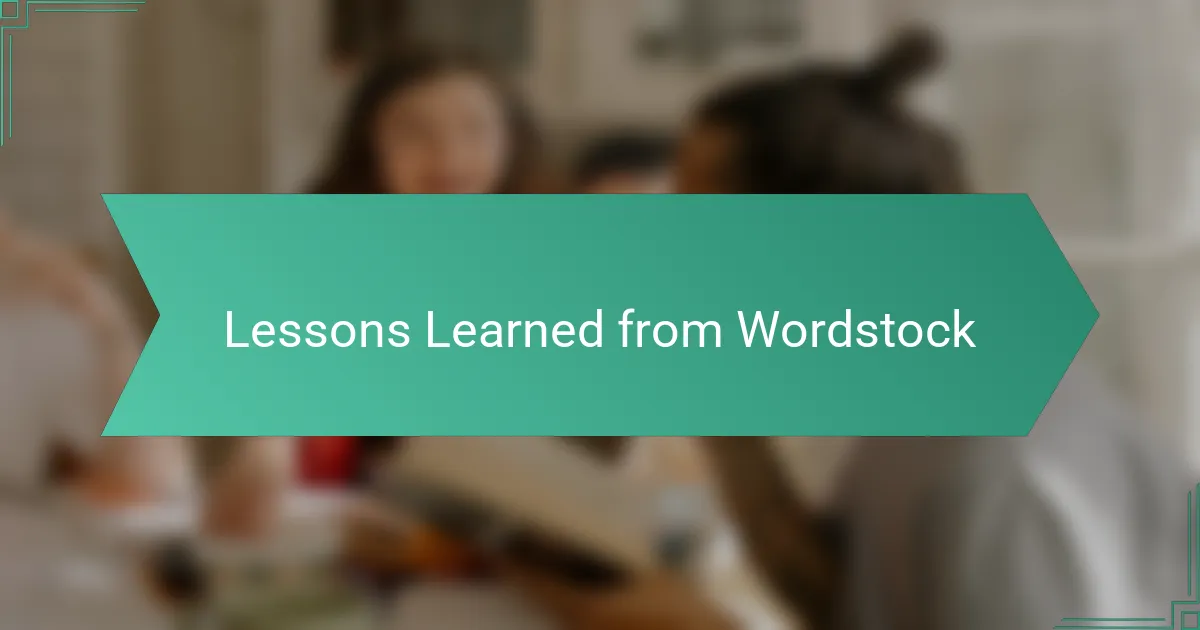
Lessons Learned from Wordstock
Wordstock taught me that finding my voice isn’t about perfection; it’s about honesty. One panel challenged me to stop censoring my thoughts and just write what truly moved me. Have you ever felt that sudden relief when you realize your story matters just as it is?
I also learned that vulnerability isn’t a weakness but a bridge to connection. During a workshop, sharing a deeply personal piece felt terrifying, yet the warm response I received gave me courage I hadn’t expected. Isn’t it amazing how opening up can invite others to do the same?
Perhaps the most powerful lesson was that growth comes from community. The conversations I had—both in sessions and over coffee breaks—reminded me that every writer’s journey is filled with doubts and breakthroughs. Have you noticed how being surrounded by fellow storytellers helps your own voice grow stronger? I certainly have.
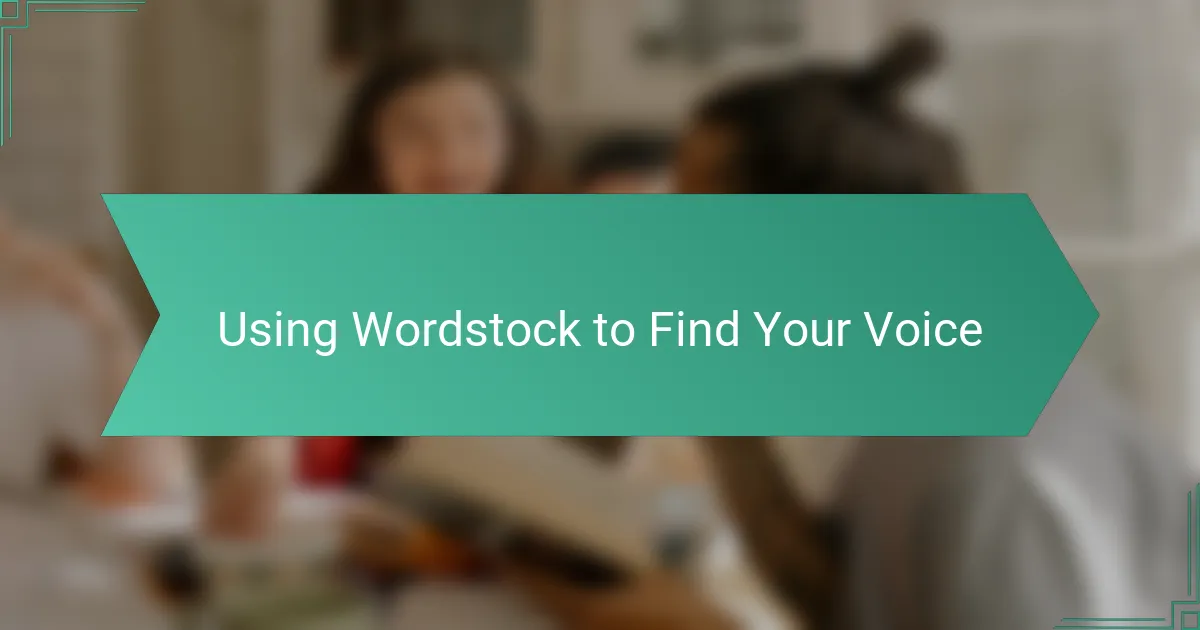
Using Wordstock to Find Your Voice
Using Wordstock to find your voice felt like peeling back layers I hadn’t realized were there. I remember sitting in a panel, initially hesitant to speak up, but the encouragement from fellow writers made me open up in ways I never thought possible. Have you ever experienced a moment when the right question or prompt suddenly unlocked something inside you?
What I found most striking about Wordstock was the way it nurtured experimentation. Trying out different writing styles during workshops wasn’t just about technique—it was about discovering which parts of myself resonated with words. Does it surprise you how much a single exercise or conversation can shift your perspective on your own work?
Between sessions, the casual chats—over coffee or in hallways—were where my voice truly began to take shape. Sharing struggles and triumphs with others who understood my journey made me realize that my unique perspective was not just valid, but needed. Isn’t that realization the spark every writer hopes to find?